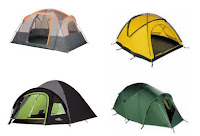Tent that there are many options for this day really can be confusing and disturbing to make a choice. There are lighter tents, camping tents, family camping tents, winter camping tents, large family camping tents, outfitter tents, and tent with built-in lighting. So how do we choose a tent that is really good and suits your needs? Well, let's start sorting.
Reliability
The first job of your tent is to provide reliable shelter, right? It goes without saying that you want a tent that will last. Here are a few things to look for. The best tents have reinforced seams in high stress areas and factory taped seams for extra waterproofing. Aluminum poles are stronger than fiberglass and are especially recommended for large tents. But fiberglass is fine for many smaller tents. The material used for the bottom, sides and fly all have a different function. The bottom material is usually the heaviest material.
However, it is always recommended that you put a tarp or "footprint" down under the tent to protect it from sharp objects and rocks that may puncture the tent material. The construction of most tent bottoms is fashioned after a bathtub to more efficiently keep rain out and it works very well. The sides are typically breathable nylon or fine mesh to keep critters out, airflow moving, and condensation from forming. The flys are generally light, but tough material, designed to be stressed and stretched over the tent while keeping you dry.
How Big?
And how many will be relying on your shelter? Are there one, two, four, or more campers in your party? When you are sizing your tent there are few things that you may want to remember. Always get a tent that sleeps one more person than you plan on camping with. The sizing called out in the specifications for tents only accounts for sleeping space. You'll want room to store your gear and still have space to move around. Some tents will also feature a vestibule, which is an extra storage space, built into the design. And you'll want enough space to sit up comfortably. If you have to spend extra time in your tent because of bad weather you'll be glad you have the room.
When Is Your Season?
You will see in the descriptions of tent information, 3 season and 4 season ratings. Most campers tend to spend most of their adventure time camping in spring, summer, or fall so a 3 season tent is perfect. So if you want a well ventilated tent for warm season camping, go for a 3 season tent. A 4 season tent is meant for, well, just that. The 4 season tent generally will have a heavier fly and less ventilation to better keep the occupants warm on a cold, winter camping trip. Camping in the snow? Then a 4 season tent is for you.
Practice, Practice
When you see a tent in a picture or on a showroom floor, it is easy to overlook how user friendly it is (or isn't). Most tents have two to six poles or more and an assortment of hooks, clips, brackets, eyelets, and fabric tubes to maneuver into place to get them set up properly. Have a look at ease of use (setup) to make your choice before you buy. And when you get it home, DO haul it out to the back yard, and practice setting it up! You'll be glad you did when you realize you have an audience at the campground evaluating your family camping tent setup skills.



No comments:
Post a Comment